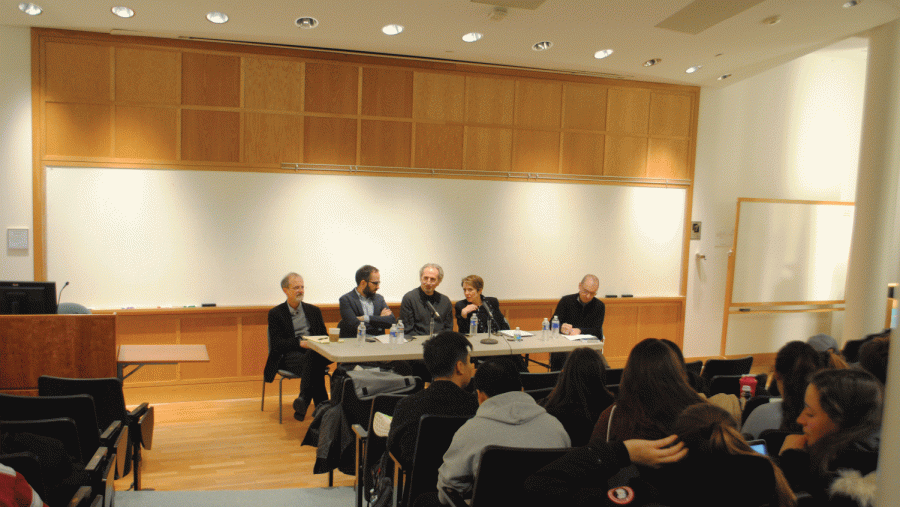Faculty Panel Reviews President Trump’s Rhetoric and its Global Impact
On Monday February 6, the Department of Peace and Conflict Studies hosted a panel titled “Trump’s Words and the World: Global Populism and the International Community.” The panel was composed of Donald M. and Constance H. Rebar Professor in Humanities, Professor of English Peter Balakian, George R. and Myra T. Cooley Professor of Peace and Conflict Studies, Professor of Geography Daniel Monk, Assistant Professor of Peace and Conflict Studies Jacob Mundy and Professor of Anthropology and Peace and Conflict Studies, Director of the Division of University Studies; Christian A. Johnson Chair in Liberla Arts Studies Nancy Ries. Each presented their perspectives on President Trump’s words and his first two weeks in office.
Balakian began the panel by discussing Trump’s language, arguing that there was an alarming disconnect between Trump’s words and reality. He provided numerous quotes from Trump, and categorized them accordingly. Some of these fell under the “blatant lies” category.
“The strategy has a momentary impact of sensationalism,” Balakian said of Trump’s use of rhetoric.
Balakian likened this type of sensational language to that of sales talk and reality television. He also accused Trump of using ungrounded extremes and highlighted instances in which Trump seemingly contradicted himself.
Monk focused on what Trump’s presidency means for America in the International sphere and speculated as to whether or not America was moving towards an authoritarian state or a pseudo-democracy. Monk offered that perhaps the United States was losing its hegemony on a global scale.
“I think we have to start studying this country without the assumption of American exceptionalism,” Monk said.
Monk argued that discussing America today must be done in a new way, since it has reached an inflection point of realignment.
“There is a legitimate protest that may have been illegitimately expressed here,” Monk continued. He urged the audience to ask questions backwards and think about why there is a constituency that does not care about Trump’s rhetoric and that seeks an illiberal agenda.
Mundy began by discussing Trump’s recent travel ban. In trying to reason with the executive order, Mundy explored possible explanations for which countries were placed onto the list and why certain countries like Afghanistan and Pakistan were excluded from the executive order. He also noted that all of the countries on the list were countries without Exxon Mobil connections, suggesting a connection to now Secretary of State Rex Tillerson.
“Will the United States and Russia now join forces to promote peace in Syria?” Mundy asked.
He then cited statistics saying that the year from 2014-2015 had the highest fatality numbers since the Cold War, and that conflict continues to become more prevalent because of the Islamic State. Mundy claimed that Trump’s plan to address the global trends toward violence includes the creation of a working group, a continuation of former President Obama’s special force tactics and closer collaboration with Russia.
Ries continued the discussion by shifting the focus to Russia. She cited the famous Trump-Putin “bromance” memes and reminded the audience to take friendlier relations with Russia seriously.
“It’s not funny for a variety of reasons,” Ries said of Trump’s relationship with Vladimir Putin. She then explored the possibility of a strategic realignment of the relationship between the United States and the Russian Federation.
“Putin says outrageous things but they’re well scripted and well timed,” Ries said of Putin. She argued that Trump probably wants a good relationship with Putin more than Putin does with the Trump administration.
Senior Courtney Benoit shared her perceptions and expectations of the panel.
“I came to the panel mostly because I was curious to hear their particular views as academics,” Benoit said. “I thought that the point Mundy made about the ban was immensely poignant, as well as the idea that Russia and the U.S. would want to undermine China.”
Senior Claire Binder shared her views on the impending political climate.
“I really enjoyed the panel. It was interesting to hear an in-depth, interdisciplinary analysis of Trump’s rhetoric from our wonderful PCON department,” Binder said. “I do not know if there was a majority consensus about how we should address Trump’s words or how we should move forward. I think, in the end, words matter. Rhetoric matters. I cannot say I’m very optimistic about the next four years because the truth has already been so contorted and manipulated by Trump and his PR team to fit his agenda. But I am hopeful truth and ‘justice’ as Confucius says will prevail, so long as we continue to hold him accountable.”







